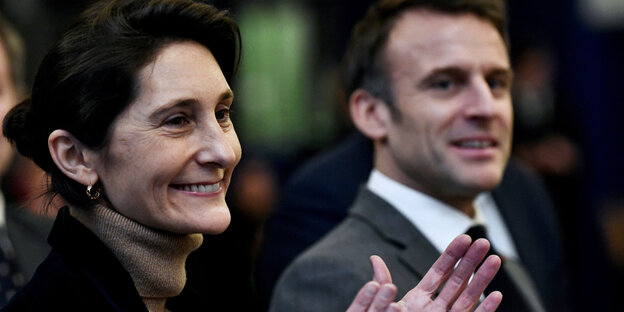The list of French ministers is public. The fact that this took a long time indicates that the negotiations were difficult. Some names are surprising.

Amélie Oudéa-Castéra (left) remains Minister of Sports. An education minister who sent her children to private schools was not well received Photo: Reuters
PARIS taz | Gabriel Attal was appointed the new Prime Minister by French President Emmanuel Macron on January 9. Three days later, half of the ministers were appointed. Since then, France has been waiting for the remaining positions to be filled. The fact that it took Macron a whole month to do this is unusually long and suggests that the difficulties were greater than expected.
The president had two problems: from the beginning, the decision to entrust the Ministry of Education to the previous Minister of Sports, Amélie Oudéa-Castéra, was controversial. He Release and the online magazine Mediapart then revealed that the new minister, who was supposed to be in charge of the public school system, was going to send her children to an elite private Catholic school.
The fact that she tried to cover this up only made the controversy worse for her. The former Minister of Justice, Nicole Belloubet, will become Minister of Education in her place, while Oudéa-Castéra will continue in the position of Minister of Sports during the organization of the Summer Olympic Games in Paris.
The second problem is politically more serious. Centrist Democrat François Bayrou, whose support for Macron owes much to his election as president in 2017, wanted to return to the government of his party (Mouvement Démocrate) after being acquitted in a trial for embezzlement of funds from the EU. All the media assumed that he wanted to take over the Ministry of Education. He held this position from 1993 to 1997 under then-president Jacques Chirac.
Surprising rejection
To everyone's surprise, in the middle of the week he announced that he did not agree with the political line of the Attal government. That is why he does not want a ministerial position in the cabinet. Bayrou harshly criticized educational policy and the growing imbalance between the Parisian metropolis and the provinces.
The following day it was announced that the prosecution planned to appeal Bayrou's acquittal. Was this the real reason why the center democrat, who has been one of the country's leading politicians for 25 years and has already run twice for the position of state president, resigned from the promised ministry?
What also draws attention to the list of 34 ministers: the former ministers who were counted as part of the “left wing” under the Macronist government and some of whom had spoken out against the immigration law, to the that the left opposed, are gone. In particular, we are talking about the former Minister of Transport, Clément Beaune, the former Minister of Labor, Olivier Dussopt, and the former government spokesman, Olivier Véran. In many media comments, this is seen as confirmation of the political shift to the right that Macron initiated in the immigration law debate.
PARIS taz | Gabriel Attal was appointed the new Prime Minister by French President Emmanuel Macron on January 9. Three days later, half of the ministers were appointed. Since then, France has been waiting for the remaining positions to be filled. The fact that it took Macron a whole month to do this is unusually long and suggests that the difficulties were greater than expected.
The president had two problems: from the beginning, the decision to entrust the Ministry of Education to the previous Minister of Sports, Amélie Oudéa-Castéra, was controversial. He Release and the online magazine Mediapart then revealed that the new minister, who was supposed to be in charge of the public school system, was going to send her children to an elite private Catholic school.
The fact that she tried to cover this up only made the controversy worse for her. The former Minister of Justice, Nicole Belloubet, will become Minister of Education in her place, while Oudéa-Castéra will continue in the position of Minister of Sports during the organization of the Summer Olympic Games in Paris.
The second problem is politically more serious. Centrist Democrat François Bayrou, whose support for Macron owes much to his election as president in 2017, wanted to return to the government of his party (Mouvement Démocrate) after being acquitted in a trial for embezzlement of funds from the EU. All the media assumed that he wanted to take over the Ministry of Education. He held this position from 1993 to 1997 under then-president Jacques Chirac.
Surprising rejection
To everyone's surprise, in the middle of the week he announced that he did not agree with the political line of the Attal government. That is why he does not want a ministerial position in the cabinet. Bayrou harshly criticized educational policy and the growing imbalance between the Parisian metropolis and the provinces.
The following day it was announced that the prosecution planned to appeal Bayrou's acquittal. Was this the real reason why the center democrat, who has been one of the country's leading politicians for 25 years and has already run twice for the position of state president, resigned from the promised ministry?
What also draws attention to the list of 34 ministers: the former ministers who were counted as part of the “left wing” under the Macronist government and some of whom had spoken out against the immigration law, to the that the left opposed, are gone. In particular, we are talking about the former Minister of Transport, Clément Beaune, the former Minister of Labor, Olivier Dussopt, and the former government spokesman, Olivier Véran. In many media comments, this is seen as confirmation of the political shift to the right that Macron initiated in the immigration law debate.